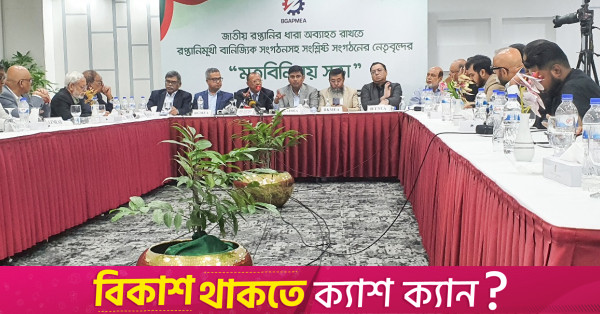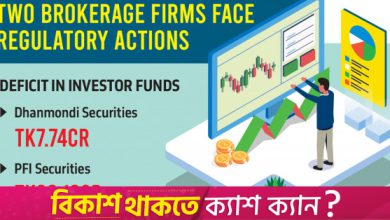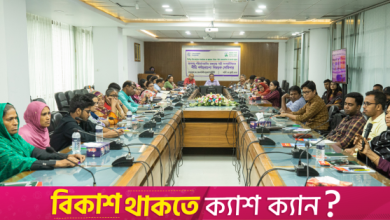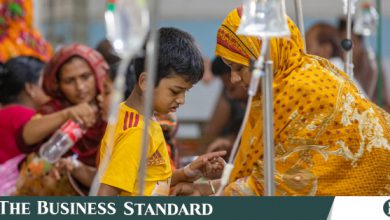Fear of harassment silenced us for 15 years: Business leaders


Exporters claimed that the fear of harassment by the government has cast a shadow over all aspects of their business operations, preventing them from speaking out or challenging the status quo. Photo: TBS
“>
Exporters claimed that the fear of harassment by the government has cast a shadow over all aspects of their business operations, preventing them from speaking out or challenging the status quo. Photo: TBS
Leaders of export-oriented businesses have said that, during the 15-year Awami League regime under Sheikh Hasina, they were unable to freely express their views due to constant fear of harassment and other forms of oppression.
At an event at the Pan Pacific Sonargaon Dhaka today, they also called for the resignation of the NBR chairman and the postponement of Bangladesh’s LDC (Least Developed Country) graduation, scheduled for 2026, due to a recent discovery of major errors in economic data.
Exporters claimed that the fear of harassment by the government has cast a shadow over all aspects of their business operations, preventing them from speaking out or challenging the status quo.
The Bangladesh Garments Accessories and Packaging Manufacturers and Exporters Association organised the event titled “Discussion among the export-oriented business leaders to sustain the momentum of national exports.”
While addressing the event, the trade organisation’s President, Md Shahriar, said that their primary discussion topics are customs and bonds.
He also requested the formation of a committee to coordinate among export-oriented industries to address their challenges and needs.
Abdul Awal Mintoo, the former president of the Federation of Bangladesh Industries and Chambers of Commerce (FBCCI), said that businesses should support the political party elected through a democratic process, as politics and the economy are complementary.
He said the interim government, which came to power as a result of the student movement, should hold early elections.
“We do not want to live under an unrepresentative government. We do not want to be disenfranchised,” he said.
Mintoo criticised the previous government for allowing public welfare institutions to be held hostage by a few individuals.
BGMEA Vice President Abdullah Hill Rakib urged political party representatives to allow businessmen to concentrate on their work, stressing that traders should not involve in political activities.
He voiced concerns about vandalism at garment factories and the lack of effective response, noting that they have deployed 100-500 community police members to ensure their workers’ safety.
Despite ongoing production, Rakib said that factories are reluctant to send goods to the port due to the current crisis, with each holding around 40 containers of products. Factories are also struggling with cash flow issues.
He requested a six-month extension for deferring utility bill payments and cautioned against halting business operations due to delays in loan repayments.
Rakib also advocated for postponing the LDC graduation but acknowledged the need to address specific issues to prevent further scrutiny from the EU.
Furthermore, the BGMEA vice president called for an overhaul of the NBR, suggesting that individuals who understand the economy should be appointed there. He urged for the swift cancellation of NBR’s Statutory Regulatory Orders (SROs) that are not business-friendly.
Abul Kasem Haider, president of the Bangladesh Sewing Thread Manufacturers and Exporters Association, said over the last 15 years, all business forums have become politicised, and their leaders were acting as political activists.
He called for a transformation of these organisations into true business associations and advocated for a “purge campaign” across all such bodies.
Kasem said lending rates should be reduced and industries should get gas and electricity at favourable rates.
He also called for reforms in banking laws, such as limiting the number of directors from the same family to one.
According to Haider, the current 16% interest rate is a result of money laundering, and he urged strict actions against defaulters, including the formation of a special tribunal to combat corruption.
BGMEA Director Shams Mahmud raised concerns about Bangladesh’s upcoming graduation from the LDC (Least Developed Country) status, arguing that the data supporting this decision was fabricated and suggesting that the graduation should be delayed by at least 10 years.
He demanded to publish a white paper to make a clear understanding of the country’s economic strength. Also, the harassment by NBR needs to be addressed immediately.
“Sri Lanka managed to turn its situation around within a year, Bangladesh could achieve similar results with the right measures,” he added.
Mohammad Hatem, the executive president of the Bangladesh Knitwear Manufacturers and Exporters Association (BKMEA), who moderated the event, said, “Following the recent student movement, there has been a call for necessary reforms. Everyone should cooperate with the government to restore stability in the country.”
Showkat Aziz Russell, president of the Bangladesh Textile Mills Association (BTMA), said, “Previously, we received incentives that significantly contributed to the growth of the textiles industry, which was reduced by the last government.”
He also criticised the previous government’s decision to increase gas and electricity prices without consulting businesses, describing it as a burden on the industry.




